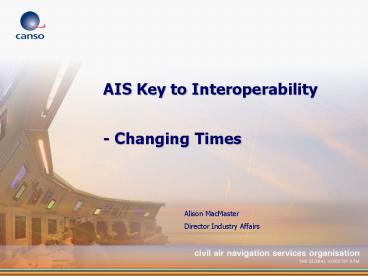AIS Key to Interoperability Changing Times - PowerPoint PPT Presentation
1 / 18
Title:
AIS Key to Interoperability Changing Times
Description:
Airports Authority of India. Airservices Australia. Airways New Zealand. ANS ... Brings together airlines, civil aviation authorities & airports reliant on: ... – PowerPoint PPT presentation
Number of Views:63
Avg rating:3.0/5.0
Title: AIS Key to Interoperability Changing Times
1
AIS Key to Interoperability - Changing Times
Alison MacMaster Director Industry Affairs
2
Introducing CANSO
- Civil Air Navigation Services Organisation
- Global Trade Association for ANS Providers
- Open to all aviation industry players
- Founded 1998, based in Amsterdam
- Worldwide 44 Full 28 Associate Members
3
CANSO Members
AENA - Spain Aerothai - Thailand Airports
Authority of India Airservices Australia Airways
New Zealand ANS - Czech Republic ATNS - South
Africa ATSA - Bulgaria Austro Control -
Austria AVINOR - Norway AZANS -
Azerbaijan Belgocontrol - Belgium CAA
Uganda DFS - Germany DHMI Turkey DSNA -
France EANS - Estonia ENAV SpA - Italy FAA -
USA Georgian Air Navigation Ltd HungaroControl -
Hungary Irish Aviation Authority Jersey Channel
Isl. CZ Kazaeronavigatsia LFV - Sweden
Air Navigation Service Providers
Industry Stakeholders
LGS - Latvia LPS - Slovak Republic LVNL - the
Netherlands MATS - Malta MoldATSA - Moldova NAMA
- Nigeria NANSC - Egypt NATS - UK NAV Canada NAV
Portugal Naviair - Denmark Oro Navigacija -
Lithuania Poland Airports / PATA ROMATSA -
Romania Serco skyguide - Switzerland Slovenia
Control SMATSA - Serbia
Montenegro UkSATSE - Ukraine
4
(No Transcript)
5
Each ANSP is unique
- National ANS model result of domestic politics
- Differing views on infrastructure liberalisation
- Dependent on State finances and investments
- Each ANSP is a product of its national
environment resulting in fragmentation of AIS
provision.
6
ATM Global Network Management
7
Aviation Industry Value System
RD
Tech
Airports
ATM
Airlines
Passengers
8
ANS based on Business Principles
- Aim for Best Practice in ATM
- Separation of Provision Regulation
- Management based on Business Principles
- Incentives for Cost Efficiency Customer focus
- Open Market for some elements of Service
Provision
9
Air Navigation Services
- A business just like any other
10
ATM Industry faces competing Forces
Resisting change
Driving change
- A naturally conservative industry
- Cultural differences at all levels
- Strong governmental control
- ANS organised on a national level
- Increasing National Security issues
- Regulatory initiatives
- Different standards
- Highly engineered solutions
- Outdated charging systems
- Inefficient/differing operational concepts
- Working practices
- Demand for greater capacity
- Airlines needing higher performance
- Minimum delay
- Optimum flight profiles
- Lower prices
- High standards of safety
- Growing Business Orientation
- Collaboration and integration
- Financial Pressures
- Potential for service differentiation
- Vertical integration of industry
11
Traditional AIS
- Limited to mainly pre-flight embedded within
ANSPs - Isolated Islands of Information
- Differing Data Exchange Protocols
- Variation in Quality / Availability/ Timeliness
- Different Format Presentation
- Not Cost effective
- Duplication of effort
12
Role and Importance of AIS is changing
- Acceptance of ICAO Global ATM Concept
- Standardisation / Harmonisation
- Demand for cost reductions efficiency in
service delivery - Benefits from AIS Automation and Centralisation
- Changing requirements of New Technology
- RNAV,
- Required Navigation Performance
- Airborne computer-based navigation systems
13
Role Importance of AIS is changing
- Collaborative Decision Making is a key enabler
for more efficient ATM - Requires System wide information network
interoperability - Brings together airlines, civil aviation
authorities airports reliant on - A broader spectrum of data information than
that covered by traditional AIS - Real time operational information
- Timely accurate Information exchange data
sharing - Improved automated decision support tools
- Decision making based on accurate shared
information - CDM increases predictability in case of
unforeseen events or disruption.
14
Specific Areas for action
- Improvement in quality of data and introduction
of quality assurance processes - Data integrity questionable
- Opportunities for error / corruption of data
- Security of public networks used for transmission
of data - Management of all stages with data traceable to
point of origin - Requirement for interoperability
- Data interchange standardisation
- Ability to share information from a technical
perspective - Agreement to share information in a consistent
way - Industry Standards are a key source of guidance
in achieving improved levels of performance
15
New Approaches to AIS
- CANSO recognises significant work already in
train - Regional initiatives delivering significant
benefits - Regional Approaches an important step in unifying
the global community - AIS Models subject assessed for delivery of
benefits - Cost/Benefit Analysis
- Institutional Issues
- Evolutionary Issues
- Risk Analysis
- Safety and Security Case
16
Transforming AIS
Modern AIS
Traditional AIS
- A Global network
- Covering all aspects of ATM
- Quality Assured
- Available to all Aviation stakeholders
- Performance driven
- Open systems
- Seamless information flows
- Dynamic - Real time flexibility response
- Leveraging the benefits of new technology Focus
on business principles - Sharing financial risks
- Incentives rewards
- National focus
- Limited to Pre-flight
- Islands of information
- Inconsistent Quality
- Accuracy/ resolution/ Integrity
- Barriers to Data exchange
- Inflexible
- Reliance on human intervention
- Not Cost Effective
BUSINESS APPROACH
ADMINISTRATIVE APPROACH
17
(No Transcript)
18
Thank You
- For more information
- www.canso.org






























![History of the IEEE Aerospace and Electronic Systems Society Moshe Kam, Drexel University [for Eric Herz] PowerPoint PPT Presentation](https://s3.amazonaws.com/images.powershow.com/7685585.th0.jpg?_=202012101110)
